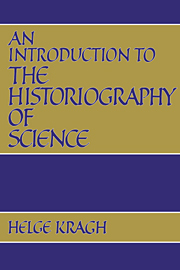Book contents
- Frontmatter
- Contents
- Preface
- 1 Aspects of the development of the history of science
- 2 History of science
- 3 Objectives and justification
- 4 Elements of theory of history
- 5 Objectivity in history
- 6 Explanations
- 7 Hypothetical history
- 8 Structure and organization
- 9 Anachronical and diachronical history of science
- 10 Ideology and myths in the history of science
- 11 Sources
- 12 Evaluation of source materials
- 13 Scientists' histories
- 14 Experimental history of science
- 15 The biographical approach
- 16 Prosopography
- 17 Scientometric historiography
- Notes
- Bibliography
- Index
2 - History of science
Published online by Cambridge University Press: 30 November 2009
- Frontmatter
- Contents
- Preface
- 1 Aspects of the development of the history of science
- 2 History of science
- 3 Objectives and justification
- 4 Elements of theory of history
- 5 Objectivity in history
- 6 Explanations
- 7 Hypothetical history
- 8 Structure and organization
- 9 Anachronical and diachronical history of science
- 10 Ideology and myths in the history of science
- 11 Sources
- 12 Evaluation of source materials
- 13 Scientists' histories
- 14 Experimental history of science
- 15 The biographical approach
- 16 Prosopography
- 17 Scientometric historiography
- Notes
- Bibliography
- Index
Summary
It is customary to distinguish between two different levels or meanings of the term ‘history’. History (H1) can describe the actual phenomena or events that occurred in the past; that is, objective history. In such expressions, for example, as ‘throughout history mankind's knowledge of nature has always increased’, history is to be understood as ‘the past’ or the phenomena that actually occurred in the past. But since we only have, and only ever will have, a limited knowledge of the reality of the past, most of what actually took place in the past will forever be beyond our grasp. The part of history (H1) that we do know is not just limited in extent but is also the product of a research process that includes the selections, interpretations and hypotheses of the historian. We do not have direct access to H1, only to parts of H1 that have been transmitted via various sources.
The term history (H2) is also used of the analysis of historical actuality (H1), that is, of historical research and its results. The object of history (H2) is thus history (H1) in the same way as the object of natural science is nature. Just as our (scientific) knowledge of nature is limited to the research results of science that are not nature but a theoretical interpretation of it, so our knowledge of the events of the past is limited to the results of history (H2) that are not the past but a theoretical interpretation of it.
- Type
- Chapter
- Information
- An Introduction to the Historiography of Science , pp. 20 - 31Publisher: Cambridge University PressPrint publication year: 1987



